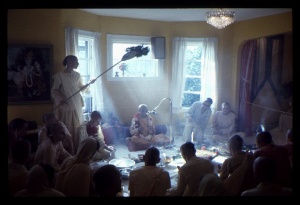CC Antya 3.54

A.C. Bhaktivedanta Swami Prabhupada
TEXT 54
- mahā-preme bhakta kahe,—‘hā rāma, hā rāma’
- yavanera bhāgya dekha, laya sei nāma
SYNONYMS
mahā-preme — in great ecstatic love; bhakta kahe — a devotee says; hā rāma hā rāma — “O Lord Rāmacandra, O Lord Rāmacandra”; yavanera — of the yavanas; bhāgya — fortune; dekha — just see; laya sei nāma — they are also chanting the same holy name.
TRANSLATION
“A devotee in advanced ecstatic love exclaims, ‘O my Lord Rāmacandra! O my Lord Rāmacandra!’ But the yavanas also chant, ‘hā rāma, hā rāma!’ Just see their good fortune!”
PURPORT
If a child touches fire, the fire will burn him, and if an elderly man touches fire, it will burn him also. Haridāsa Ṭhākura says that a great devotee of the Lord exclaims hā rāma, hā rāma, but although yavanas do not know the transcendental meaning of hā rāma, hā rāma, they say those words in the course of their ordinary life. For the yavanas the words hā rāma mean “abominable,” whereas the devotee exclaims the words hā rāma in ecstatic love. Nevertheless, because the words hā rāma are the spiritual summum bonum, the fact is the same, whether they are uttered by yavanas or by great devotees, just as fire is the same both for a child and for an elderly man. In other words, the holy name of the Lord, hā rāma, always acts, even when the holy name is chanted without reference to the Supreme Lord. Yavanas utter the holy name in a different attitude than devotees, but the holy name hā rāma is so powerful spiritually that it acts anywhere, whether one knows it or not. This is explained as follows.